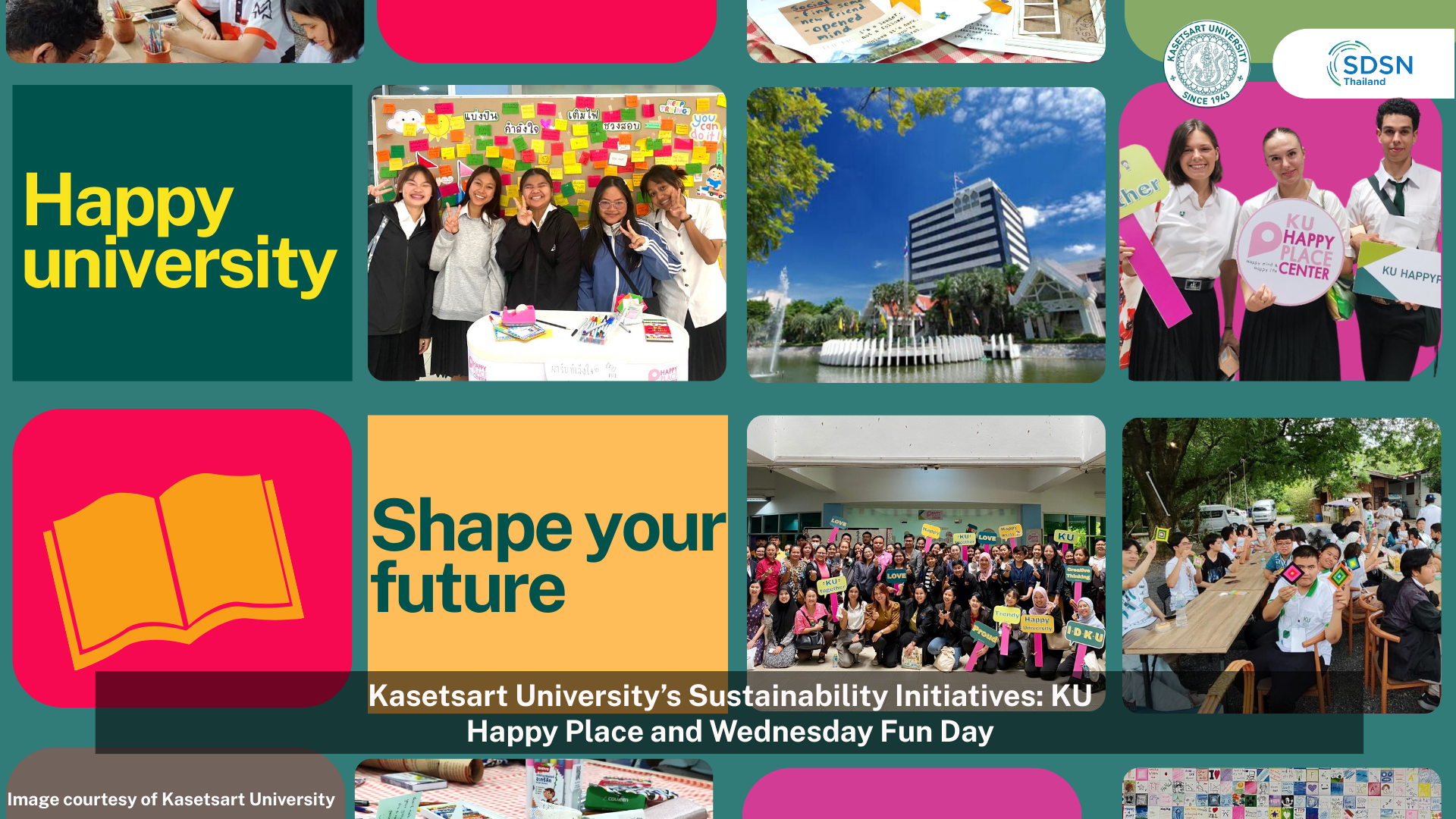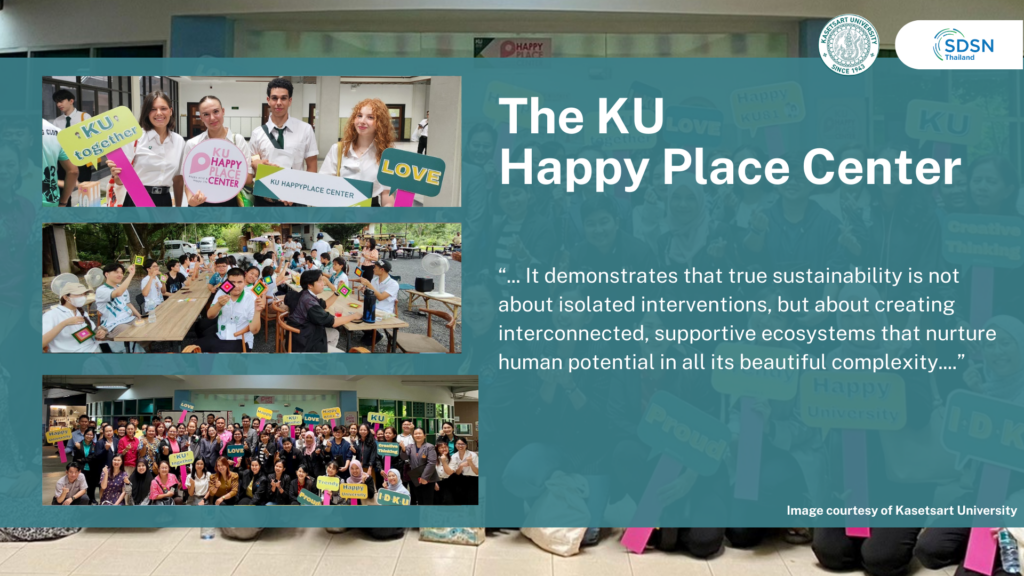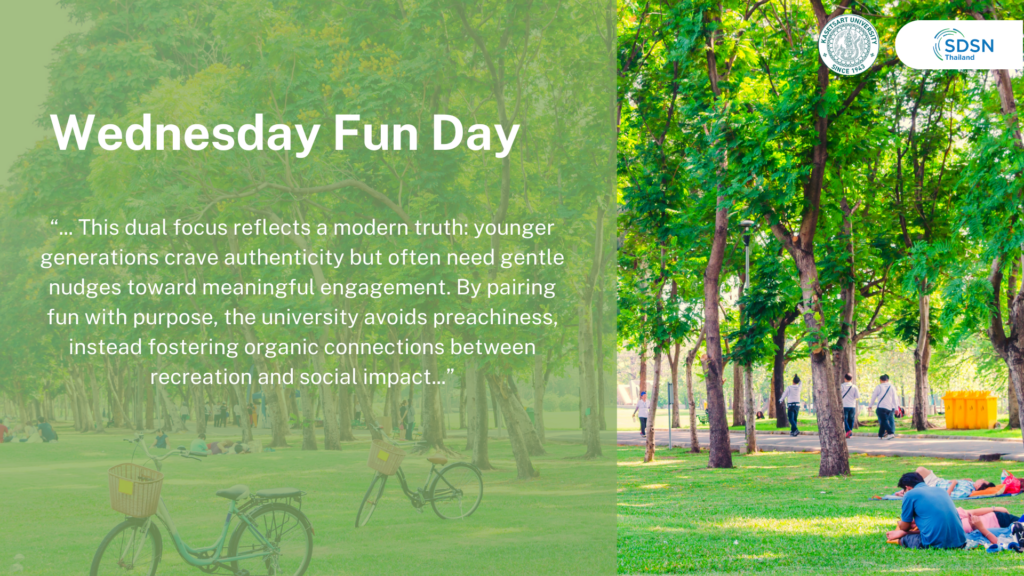
Kasetsart University’s Sustainability Initiatives: KU Happy Place and Wednesday Fun Day
Human wellbeing is a cornerstone of holistic development. At Kasetsart University, the sustainability initiatives focus on nurturing its students’ physical, mental, social wellness and social engagement. Read this extensive story to learn more.
Reimagining Sustainability: Beyond Physical Transformation
In the complex landscape of modern education, Kasetsart University stands as a beacon of holistic development, challenging traditional notions of sustainability by embracing a profound, multidimensional approach to student well-being. Far more than a mere institution of academic learning, the university has pioneered an innovative model that recognizes sustainability as a deeply interconnected system of physical, mental, and social wellness.
The university’s groundbreaking KU Happy Place Center embodies this revolutionary perspective. Emerging from a collaborative effort between the Special Student Services Unit and the Student Wellness and Counseling Unit, this initiative represents a transformative approach to student support that goes far beyond conventional educational frameworks.
At its core, the center understands that true sustainability is not just about environmental preservation or infrastructural improvements, but about nurturing human potential. With 70,000 students, Kasetsart University could easily become overwhelmed by the sheer scale of individual needs. Instead, they’ve chosen to see this diversity as an opportunity for comprehensive care.
The KU Happy Place Center operates on a radical premise: that student success is intrinsically linked to mental health, personal development, and holistic support. By providing a dedicated space where students can access psychological counseling, participate in healing activities, and receive personalized support, the university acknowledges that education is not just about academic achievement, but about cultivating resilient, empowered individuals.
This approach addresses multiple dimensions of sustainability. It reduces social inequalities by providing specialized support for students with diverse needs, creates inclusive educational environments, and develops comprehensive skills that extend beyond traditional academic learning. From social skills to career development, from mental health screening to personalized educational planning, the center ensures that every student has the opportunity to thrive.
One of the factors that makes this model truly remarkable is its holistic vision. The center doesn’t just treat symptoms; it creates mechanisms for prevention, healing, and continuous personal growth. By integrating psychological support, academic guidance, and skill development, Kasetsart University is not just educating students—it’s empowering them to become agents of positive change.
The implications of this approach extend far beyond the university campus. By investing in student well-being, the institution is essentially investing in societal transformation. Each supported student becomes a potential catalyst for broader social change, equipped with the mental resilience, skills, and understanding needed to address complex global challenges.

In a world increasingly characterized by complexity and rapid change, Kasetsart University’s model offers a compelling blueprint for educational institutions worldwide. It demonstrates that true sustainability is not about isolated interventions, but about creating interconnected, supportive ecosystems that nurture human potential in all its beautiful complexity.
As we look to the future, the KU Happy Place Center stands as a powerful testament to a new paradigm of education—one that sees students not as passive recipients of knowledge, but as dynamic, holistic beings capable of extraordinary growth and transformation.
Reimagining Outdoor Engagement: From Screen Time to Community Thrive
In an era where screens dominate daily life, fostering outdoor engagement isn’t just a hobby—it’s a cultural imperative. At Kasetsart University, initiatives like “Wednesday Fun Day” and Inthranee Jantharasatit Field (Inthranee Field) are redefining how communities connect, exercise, and grow. It is where movement meets momentum. These spaces blend recreation with purpose, proving that joy and social impact can coexist seamlessly. Every Wednesday at 4 PM, Inthranee Field transforms into a vibrant hub of activity. What began as a modest gathering of joggers and walkers has evolved into a social phenomenon, attracting students, staff, and even curious outsiders. The secret? Accessibility and joy. Participants aren’t just exercising—they’re part of a shared experience. Photographers capture their strides, smiles, and triumphs, offering runners personalized mementos. This approach has turned skeptics into enthusiasts: once hesitant attendees now lace up weekly, drawn by camaraderie and the university’s lush, tree-lined trails. By welcoming everyone—regardless of fitness level or affiliation—the event dismantles barriers. It’s a space where a student might jog alongside a professor or a local resident, united by the simple act of movement. This inclusivity mirrors the field’s broader ethos: a belief that outdoor engagement should be a right, not a privilege. While “Wednesday Fun Day” thrives on lighthearted energy, Kasetsart University’s vision extends to deeper societal goals. Pre-concert sustainability and mental health booths exemplify this strategy. Before live music events, attendees encounter stations distributing condoms or promoting mental health volunteerism. The approach is deliberate: lead with entertainment, then subtly integrate serious topics. Concerts become gateways to conversations about wellness, sustainability, and community responsibility. This dual focus reflects a modern truth: younger generations crave authenticity but often need gentle nudges toward meaningful engagement. By pairing fun with purpose, the university avoids preachiness, instead fostering organic connections between recreation and social impact.

Inthranee Field isn’t just a park—it’s a microcosm of urban harmony. Mornings host elderly residents practicing tai chi or brisk walking, while evenings buzz with students playing football or jogging. The space adapts effortlessly, supported by amenities like fitness equipment, food stalls, and seamless transportation links (via the Green Line BTS and free campus shuttles). Its role as a host for inter-university football tournaments further cements its status as a cultural anchor. These events attract diverse crowds, fostering school spirit and community pride. Updates on the university’s page ensure everyone stays informed, turning casual visitors into invested participants. In a world where isolation and screen dependency threaten well-being, Kasetsart University’s initiatives offer a blueprint for renewal. By prioritizing joy, inclusivity, and subtle purpose, they remind us that outdoor spaces can be catalysts—not just for physical health, but for social bonds and collective growth. Whether through a midweek jog, a concert, or a football match, these efforts prove that community thrives when we step outside, together. In conclusion, the true power of initiatives like “Wednesday Fun Day” lies not in grand gestures, but in their ability to make meaningful engagement feel effortless. By blending recreation with purpose, they turn fleeting moments into lasting connections—and screens into secondary companions.




